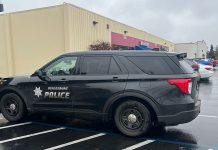The Healdsburg Unified School District (HUSD) is making some changes to its search and seizure/breathalyzer policy and setting parameters on what constitutes reasonable suspicion for being under the influence after some parents voiced concern when their Latinx children were pulled out of class for breathalyzer tests.
At a May Healdsburg school board meeting, a few parents said they felt as if their children were singled out and were upset that they weren’t notified of the occurrence of a breathalyzer test despite two negative results.
“There were questions from some stakeholders in the community around the use of breathalyzers at the high school and I can tell you that it’s a longstanding policy in probably every high school in the state to use breathalyzers,” said HUSD Superintendent Chris Vanden Heuvel. “However, in my meeting with folks it was really readily apparent that there was some confusion.”
Vanden Heuvel said there was confusion surrounding if the district can, and should be using a breathalyzer, as well as why it uses one.
Vandal Heuvel said we were not outside of any legal practices in terms of being able to use breathalyzers and that by law, schools are not required to call a parent before a test is administered.
“But it wasn’t explicitly transparent. We wanted to be more transparent with our stakeholders,” he said.
Consequently, the new policy change will add explicit language to the district’s search and seizure and breathalyzer policy that will better outline the potential use of a test.
“At the behest of some of the parents we’re bringing it forward. Today will be the first of two policy changes. This one is in our ‘search and seizure’ policy and it just has explicit language about the potential use of breathalyzers and we’re going to add the same language into our student handbook so that kids know that it potentially could happen because it really was a surprise to some of the students and parents who had encountered it,” Vanden Heuvel said.
The policy addition reads, “School officials may also conduct a search of any student, who based upon reasonable suspicion, is believed to be under the influence of alcohol or other illegal drugs. Such a search may include the use of alcohol or drug sensing devices or chemical tests, i.e. a breathalyzer.”
For the second policy change, Vanden Heuvel will be working with Healdsburg High School Principal Bill Halliday to set parameters around what constitutes reasonable suspicion and confirming that suspicion before moving into the testing phase.
In terms of parent notification, Vanden Heuvel said he doesn’t have a problem with notifying parents prior to a test if there’s time.
“Often times when there is an alcohol-related issue there is a potential health and safety issue going on and/or we’re actually trying to figure out who’s drunk and there’s multiple students who are under the influence and so we’re chasing it and time is of the essence and so we don’t always have time to be able to do that … We definitely need to notify parents in a timely manner, it’s just not always possible before,” he said.
Trustee Judy Velasquez said the district needs to make sure parents know that. Vanden Heuvel said it’s definitely something that can be added to the student handbook.
Trustee Jami Kiff said she understands that by law the school is not held accountable to call the parents beforehand, but in the two cases that were heard during public comment, neither one of those students tested positive. She asked Vanden Heuvel in that instance why the parents couldn’t have been notified beforehand.
“It would lead me to believe that it was not a situation that was life or death then why wouldn’t you take the time, if you can, just out of courtesy more than anything, to call a parent,” Kiff asked.
Vanden Heuvel said there could be a number of reasons.
“You don’t know what you’re dealing with. If the administrator does think there is reasonable suspicion, you don’t know that it’s life or death, you don’t know if there’s multiple kids involved or not … It is not about a punitive approach where we are trying to get kids in trouble, it’s making sure kids are safe at school, so us being able to conduct that investigation in a timely and thorough manner (is important) and we can’t always get parents on the phone,” he said.
In this particular case the parents weren’t called before for those reasons, according to Vanden Heuvel, however, they were called after the test.
He added that one of them (the parents) did feel that they were called a little late.
“I think given our situation right now and what we just saw at the Plaza, I think we really need to be aware of those sentiments and take that into account,” School Board Vice President Aracely Romo-Flores said, adding that there needs to be an equity lens to it. “It really tugged at my heartstrings when the family felt like they were singled out, that not all of the students were searched in that process. I really feel strongly that it needs to be more than one person that is initiating that response (breathalyzer and search).”
Vanden Heuvel said when any adult finds some piece of evidence that could be constituted as reasonable suspicion, the testing and search process can be triggered.
“When that happens, the office is notified, we usually get the student from the classroom and at that point in time, what I’m going to write very explicitly is, the administrator needs to be present and confirm that reasonable suspicion,” he said.
Healdsburg Area Teachers Association President Ever Flores echoed Romo-Flores’ thoughts and said looking through an equity lens is key.
“In terms of keeping an equity lens, I think it’s important that all students are treated equally. For instance, at a graduation ceremony a couple of years back, I could smell the alcohol on a student’s breath. I reported it and nothing happened to the student, and I can see why families are upset and why they feel targeted. I was hearing the mother’s concern last time and it really touched me … I just want you to keep it in mind that this policy should be applied to everyone regardless of your background, socioeconomic background and your ethnic background,” Flores said.
Kiff asked if breathalyzer data shows a disparity in testing.
Vanden Heuvel said currently there isn’t a data tab that says “Breathalyzer” so there is no clear tracking system, however, that is going to change so they can track more carefully who’s being breathalyzed and why.
The policy changes will return to the consent calendar for the next board meeting for approval









